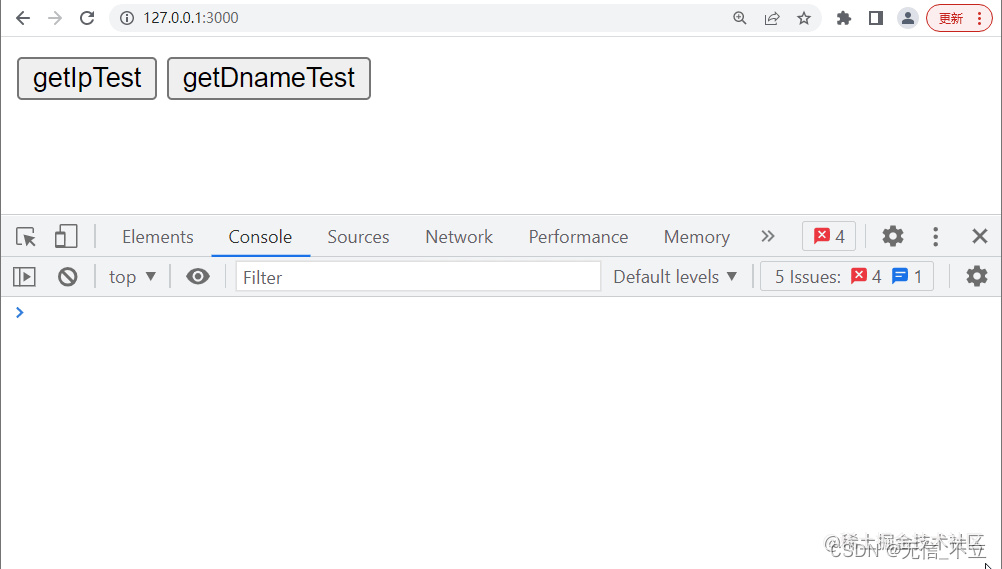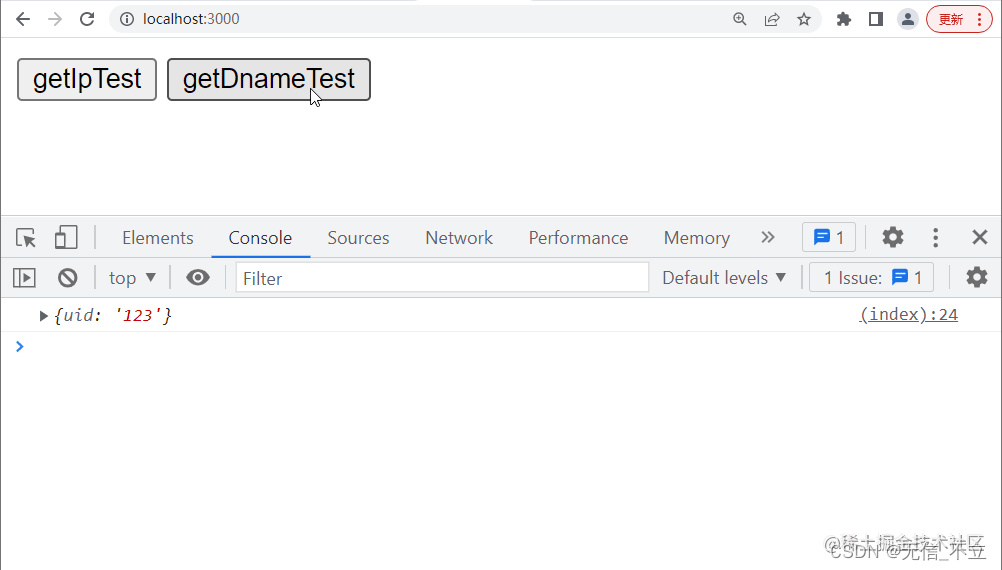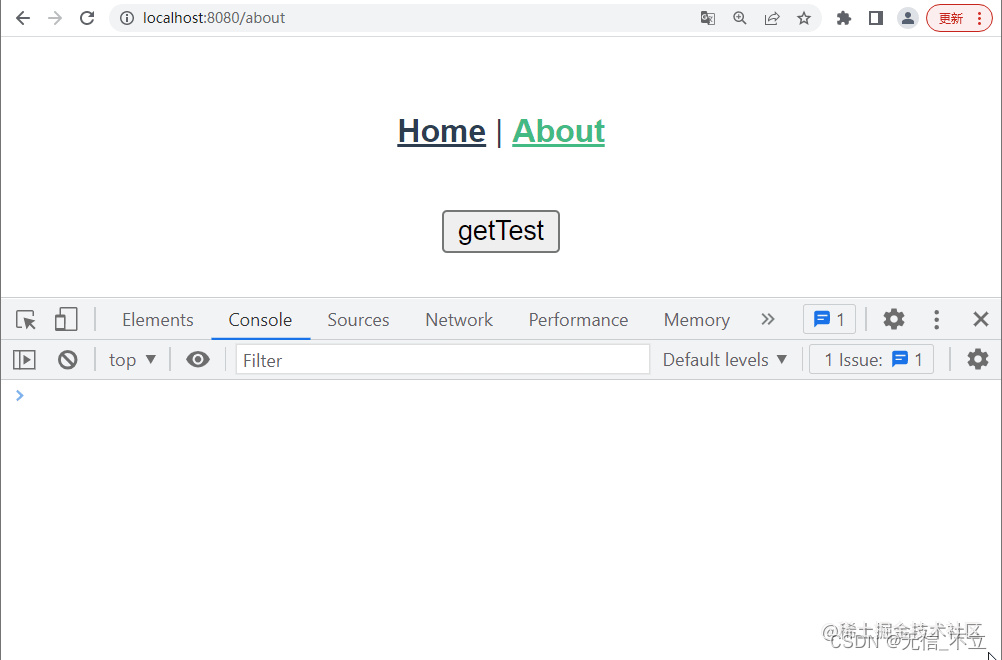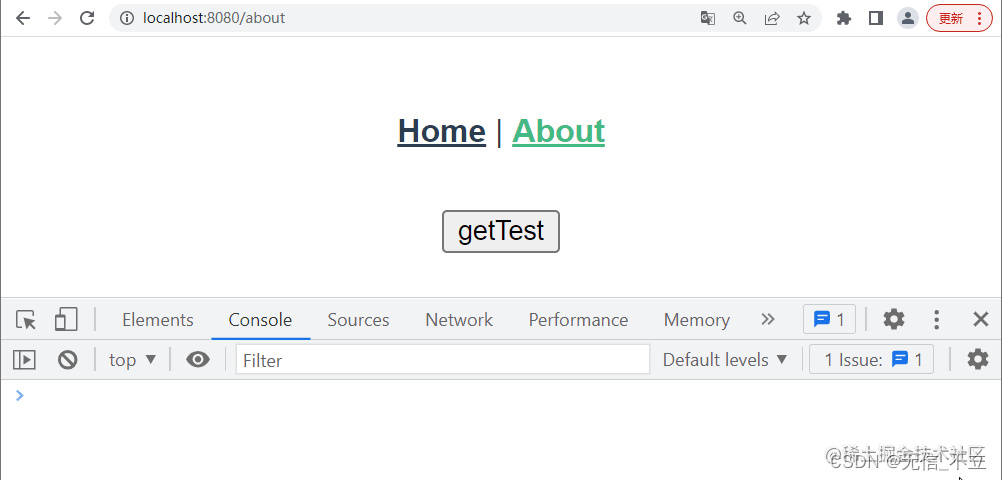当前栏目
Vue中如何解决跨域问题
跨域
跨域报错是前端开发中非常经典的一个错误,报错如下
Access to XMLHttpRequest at '......' from origin
'......' has been blocked by CORS policy:
No 'Access-Control-Allow-Origin' header is present on the requested resource.
跨域错误源自于浏览器的同源策略,想要解决跨域首先要知道什么是同源策略
同源策略
同源策略:著名的安全策略,URL有三个基本组成部分:协议+域名或ip+端口,三个必须完全相同称之为同源,不同源的称之为跨域
URL URL 对比
http://localhost:3000/ https://localhost:3000/ 不同源:协议不同
http://localhost:3000/ http://127.0.0.1:3000/ 不同源:域名或ip不同
http://localhost:3000/ http://localhost:3001/ 不同源:端口不同
http://localhost:3000/ http://localhost:3000/ 同源
http://127.0.0.1:3000/ http://127.0.0.1:3000/ 同源
注意:同源策略不是服务器行为,而是浏览器的行为,服务器会正常响应请求,但是如果不同源会被浏览器拦截
express服务器
搭建一个express服务器用来演示跨域报错
安装express
npm i express
app.js
let express = require('express')
let app = express()
app.listen(3000, () => {
console.log('服务器已启动...')
})
app.use(express.static('./views'))
app.get('/getTest', (req, res) => {
console.log(req.query)
res.send(req.query)
})
views/index.html
<!DOCTYPE html>
<html>
<head>
<meta charset="UTF-8">
<title>Document</title>
<script src="https://unpkg.com/axios/dist/axios.min.js"></script>
<script>
function getIpTest() {
axios({
method: "get",
url: "http://127.0.0.1:3000/getTest",
params: { uid: 123 },
}).then((res) => {
console.log(res.data);
});
}
function getDnameTest() {
axios({
method: "get",
url: "http://localhost:3000/getTest",
params: { uid: 123 },
}).then((res) => {
console.log(res.data);
});
}
</script>
</head>
<body>
<button οnclick="getIpTest()">getIpTest</button>
<button οnclick="getDnameTest()">getDnameTest</button>
</body>
</html>
打开浏览器访问http://127.0.0.1:3000/
调用getIpTest发送请求不会报错,因为浏览器地址栏访问的服务器是http://127.0.0.1:3000/** ,而方法内发送请求的URL也是http://127.0.0.1:3000/** ,视为同源
调用getDnameTest发送请求报错,因为浏览器地址栏访问的服务器是http://127.0.0.1:3000/** ,而方法内发送请求的URL也是http://localhost:3000/** ,视为跨域

Access to XMLHttpRequest at 'http://localhost:3000/......' from origin
'http://127.0.0.1:3000' has been blocked by CORS policy:
No 'Access-Control-Allow-Origin' header is present on the requested resource.
打开浏览器访问http://localhost:3000/
调用getDnameTest发送请求不会报错,因为浏览器地址栏访问的服务器是http://localhost:3000/ ,而方法内发送请求的URL也是http://localhost:3000/ ,视为同源
调用getIpTest发送请求报错,因为浏览器地址栏访问的服务器是http://localhost:3000/ ,而方法内发送请求的URL也是**http://127.0.0.1:3000/** ,视为跨域

Access to XMLHttpRequest at 'http://127.0.0.1:3000/......' from origin
'http://localhost:3000' has been blocked by CORS policy:
No 'Access-Control-Allow-Origin' header is present on the requested resource.
vue处理跨域
创建vue项目,安装axios模块
vue create app
npm install axios vue-axios
main.js
import axios from 'axios'
import VueAxios from 'vue-axios'
Vue.use(VueAxios, axios)
views/About.vue
<template>
<div class="about">
<button @click="getTest()">getTest</button>
</div>
</template>
<script>
export default {
methods: {
getTest() {
this.axios({
method: "get",
url: "http://127.0.0.1:3000/getTest",
params: { uid: 123 },
}).then((res) => {
console.log(res.data);
});
},
},
};
</script>
脚手架项目端口是8080而请求的express服务器端口是3000,不满足同源策略,发送请求报跨域错误

Access to XMLHttpRequest at 'http://127.0.0.1:3000/......' from origin
'http://127.0.0.1:8080' has been blocked by CORS policy:
No 'Access-Control-Allow-Origin' header is present on the requested resource.
解决办法: 配置代理服务器
vue.config.js:修改后需要重启脚手架项目
const { defineConfig } = require('@vue/cli-service')
module.exports = defineConfig({
transpileDependencies: true,
devServer: {
//配置http-proxy代理方式跨域
proxy: {
// 自定义请求的开头,使用代理方式处理/demo开头的请求,/xxx可以自定义
"/demo": {
// 往哪个服务器发请求
target: "http://127.0.0.1:3000",
pathRewrite: {
// ^代表字符串开头,实际发送请求时,会把请求开头的/demo删除
// 因为/demo并不是请求的一部分,只是个代理的标识
"^/demo": "",
},
},
// 如果有其他网址也需要跨域则继续配置
// "/其他的...": {
// target: "其他的请求地址",
// pathRewrite: {
// "^/其他的...": "",
// },
// },
},
},
})
views/About.vue
<template>
<div class="about">
<button @click="getTest()">getTest</button>
</div>
</template>
<script>
export default {
methods: {
getTest() {
this.axios({
method: "get",
// 在原来的url上去掉http://127.0.0.1:3000换成/demo
url: "/demo/getTest",
params: { uid: 123 },
}).then((res) => {
console.log(res.data);
});
},
},
};
</script>

原理:
跨域是浏览器的安全策略,服务器和服务器之间发送请求没有跨域
在启动脚手架的时候会启动一个内置web服务器
请求的时候浏览器实际并没有直接和需要请求的服务器通信,而是通过内置的web服务器在中转
条件结构流程图.png
注意:
项目上线需要把打包后的文件放在服务器上运行,而不是启动脚手架运行,也就没有内置web服务器做代理,所以此方式只适用于开发测试阶段
上线时需要使用nginx代理或者服务器配置cors(每种语言有自己不同的配置方式)
express处理跨域
express中处理跨域需要使用cors模块
npm i cors
app.js
let express = require('express')
// 引入cors模块
var cors = require("cors");
let app = express()
app.listen(3000, () => {
console.log('服务器已启动...')
})
// 配置跨域
app.use(cors({
// 允许跨域的服务器地址,可以写多个
origin: ['http://localhost:8080', 'http://127.0.0.1:8080'],
// 使用cookie时需要设置为true
credentials: true
}));
app.use(express.static('./views'))
app.get('/getTest', (req, res) => {
console.log(req.query)
res.send(req.query)
})
相关文章
- Fedora 34 无缘 PHP 8,推迟到 Fedora 35 集成
- 12月份GitHub上最热门的JavaScript开源项目
- 深入扩展文本溢出解决方案
- 为什么我不要求996,公司还能做到市值1万多亿?
- 了解这些,你就可以在Spring启动时为所欲为了
- 用Node.js进行后端开发的特点与优势
- 如何使用WinX HD Video Converter压缩大型视频文件?
- 如何遍历DOM?
- 抽象类能实例化吗?口气很强硬的说:“不能”!
- Javascript-单线程,非阻塞,异步,并发语言
- 2021年要了解的34种JavaScript优化技术
- 2021年每个CTO应该期待的10种Web开发趋势
- 仅使用CSS就可以提高页面渲染速度的4个技巧
- 一个 1 分钟就学会的 vue 小技巧(真的一看就会)
- 5个能提高前端工作效率的操作
- 推荐十个好用的程序员摸鱼网站,现在就给我玩起来!
- VUE项目性能优化实践——通过懒加载提升页面响应速度
- 一篇文章带你了解JavaScript json 数组
- 学习JavaScript之路必看的7本书
- 总结:四个Pipeline脚本式与声明式语法差异

